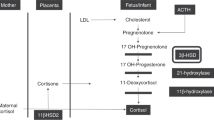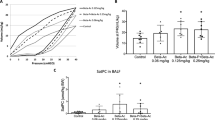Abstract
Glucocorticoids accelerate fetal lung maturation in all mammals studied1, and in some species, such as goat and sheep, concentrations of fetal cortisol increase sharply before term, bringing about a train of events leading to parturition2. Studies of cortisol in the umbilical cord blood have revealed no such increase at the end of human pregnancy. But information obtained in that way is difficult to interpret because much of the fetal cortisol is of maternal origin3,4 and its concentration, if sampled at delivery, is affected by maternal stress5. These problems can be avoided to some extent by studying other fetal corticoids. Corticosterone sulphate (Once called compound B, and abbreviated to BS) is produced by fetal adrenal glands6 and is present in greater concentrations in human fetal plasma than in maternal plasma7. It is not hydrolysed by the placental sulphatases and is a poor substrate for placental 11 β-hydroxysteroid dehydrogenase8. We report here confirmation that the bulk of maternal BS originates from the fetus, and that its concentration increases suddenly at term.
This is a preview of subscription content, access via your institution
Access options
Subscribe to this journal
Receive 51 print issues and online access
$199.00 per year
only $3.90 per issue
Buy this article
- Purchase on Springer Link
- Instant access to full article PDF
Prices may be subject to local taxes which are calculated during checkout
Similar content being viewed by others
References
Giannopoulos, G. & Tulchinsky, D. in Maternal-Fetal Endocrinology (eds Tulchinsky, D. & Ryan, K.) 310–329 (Saunders, Philadelphia, 1980).
Liggins, G. C. et al. Rec. Prog. Horm. Res. 29, 111–159 (1973).
Migeon, C. J. et al. Rec. Prog. Horm. Res. 17, 207–243 (1961).
Osinki, P. A. Nature 187, 777 (1960).
Ohrlander, S., Gennser, G. & Eneroth, P. Obst. Gynec. 48, 381–386 (1976).
Goodyer, C. G. et al. Acta Endocr. 81, 774–786 (1976).
Klein, G. P. et al. J. clin. Endocr. Metab. 36, 944–950 (1976).
Hall, C. st. G. & Giroud, C. J. P. Can. J. Biochem. 49, 1384–1387 (1971).
Fencl, M. deM, Koos, B. & Tulchinsky, D. J. clin. Endocr. Metab. 50, 431–436 (1980).
Johannisson, E. Acta Endocr. Suppl. 130, 7–107 (1968).
Winters, A. J. et al. J. clin. Endocr. Metab. 39, 269–273 (1974).
Murphy, B. E. P. J. clin. Endocr. Metab. 47, 212–215 (1978).
Mulay, S., Giannopoulos, G. & Solomon, S. Endocrinology 93, 1342–1348 (1973).
Torday, J. S., Olson, E. B. & First, N. L. Steroids 27, 869–880 (1976).
Torday, J. S., Smith, T. B. & Giroud, C. J. P. Endocrinology 96, 1462–1467 (1975).
Author information
Authors and Affiliations
Rights and permissions
About this article
Cite this article
deM Fencl, M., Stillman, R., Cohen, J. et al. Direct evidence of sudden rise in fetal corticoids late in human gestation. Nature 287, 225–226 (1980). https://doi.org/10.1038/287225a0
Received:
Accepted:
Issue Date:
DOI: https://doi.org/10.1038/287225a0
This article is cited by
Comments
By submitting a comment you agree to abide by our Terms and Community Guidelines. If you find something abusive or that does not comply with our terms or guidelines please flag it as inappropriate.



